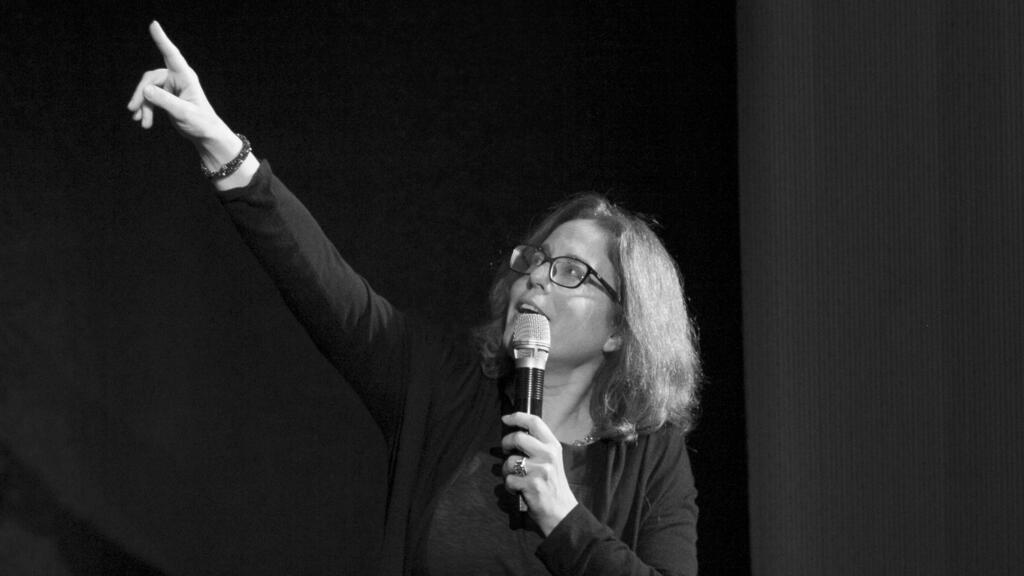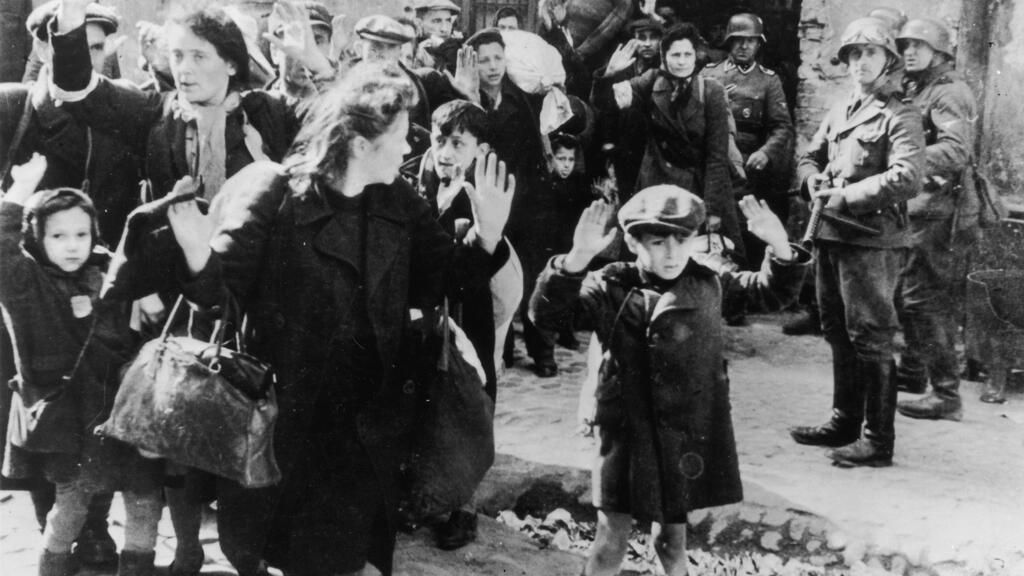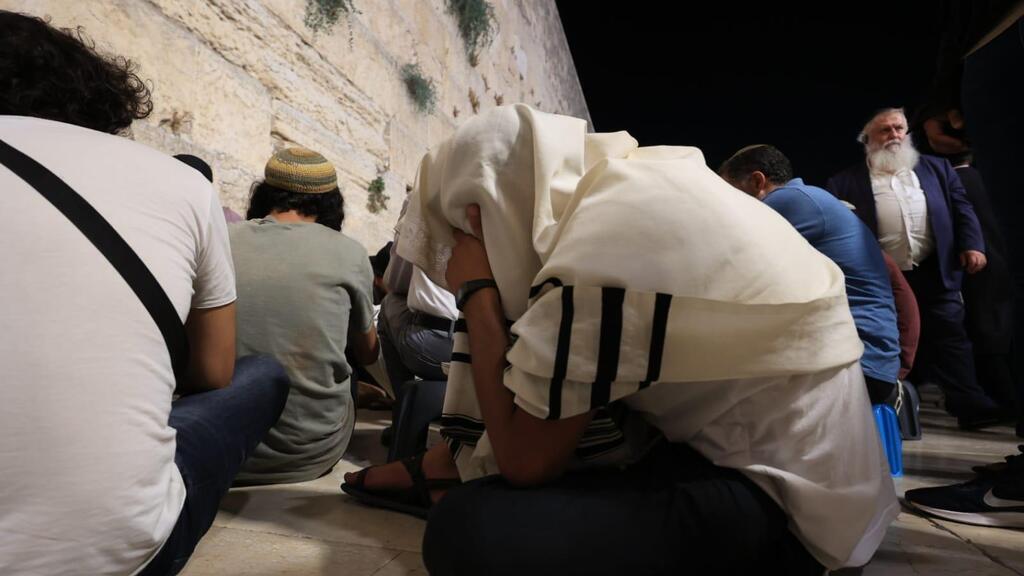When Rabbi Yehuda Leib Bialer returned to Warsaw not long after the Holocaust, he penned with a bleeding heart the lamentation (kinah) "Èli Èli Nafshi Bekhi" (My God, My God, My Soul Weep). He lamented the "desolate congregations" and the "generations that were cut off," mourning for Jews who were buried alive or perished in gas chambers.
Read more:
Bialer drew inspiration for his writing from the famous lamentation "Eli Zion Ve-Areiha" traditionally recited on Tisha B'Av, and today some synagogues recite his kinah using the same melody as "Eli Zion Ve-Areiha."
Bialer's lamentation is just one among the many elegies composed about the greatest catastrophe that befell the Jewish people in modern times. Most of these elegies were written in poetic language, with numerous allusions to traditional sources.
"Bialer took a familiar framework and infused it with new content," explains Rabbi Professor Dalia Marx, an expert in liturgy (prayer) from Hebrew Union College in Jerusalem and the author of the book "From Time to Time: Journeys in the Jewish Calendar." According to Marx, "the familiar framework grants the text authority, significance and dignity."
A similar process of composing new content while leaning on ancient liturgical poems was undertaken by Rabbi Shmuel HaLevi Wosner, who wrote the kinah "Esh Tukad B'Kirbi" (A Fire Burns Within Me) about the Holocaust. It was inspired by earlier poems with the same name lamenting the destruction of Jerusalem, although their structures differ. The kinah "Chayot Esh" (Living Fire) composed by Rabbi Elchanan Halperin also begins with the words "Esh Tukad B'Kirbi."
According to tradition, various calamities occurred on Tisha B'Av, not only the destruction of the Temples. The Talmud lists five specific tragedies, which are already found in Jewish sources.
"There is a list of all sorts of Jewish expulsions that are said to have happened on Tisha B'Av, even if historical records do not explicitly state that they occurred on that day," Marx notes. "All the tragedies are incorporated into this day; it becomes a receptacle for all sorrows. The psychological explanation for this is understandable: the Jewish people have faced numerous troubles, and it is not feasible to have the entire year filled with days of remembrance and hardship."
The integration of lamentations (kinot) about the Holocaust into prayers seems justified, especially considering that, in the past, lamentations were composed for events of a smaller magnitude, such as the Cossack riots, which were pogroms carried out against the Jews in Ukraine in 1648. However, this idea was met with objection, primarily on the grounds that the spiritual level of later generations is not high enough to renew kinot, an endeavor that requires sanctity. For instance, Rabbi Yekutiel Yehuda Halberstam, the Admor of Klausenburg, who was a Holocaust survivor himself, opposed the incorporation of new lamentations about the Holocaust into prayer.
Rabbi Yosef Dov Soloveitchik wrote that on Tisha B'Av we fast and mourn not only for the tragedies and disasters that occurred on that day but for all the exiles, tragedies and calamities that have befallen the Jewish people throughout generations. He argued that there is no need to add new lamentations about the Holocaust, stating that the six million Jews who perished should naturally be remembered on Tisha B'Av. He believed that the emotions of despair, grief and sorrow conveyed in the traditional kinot already encompass the Holocaust as well.
There is a debate among different communities regarding whether it is appropriate to add new kinot, especially among the Haredi Jews, Marx explains. The National Religious Jews do not hesitate to include additional kinot in their prayers, including those composed about the Holocaust. Even in non-Orthodox communities, new lamentations about the Holocaust are added, but there is almost no unified text that mentions the Holocaust in prayer that is shared by all synagogues. Some synagogues include "El Malei Rachamim" (Merciful God) and the "Yizkor" (Remember) prayer.
3 View gallery


Rabbi Prof. Dalia Marx calls for thinking outside the box and incorporating new kinot into prayers
(Photo: Dana Bar Siman Tov)
The debate over commemorating the Holocaust on Tisha B'Av is connected to another discussion about the appropriate day for remembering the Holocaust. Some argue that it should be mentioned along with the events observed on Tisha B'Av, while others suggest a separate day. Yom HaShoah, Holocaust Remembrance Day, is marked on the 27th of Nisan, and the Chief Rabbinate of Israel also designates the 10th of Tevet as a general day for reciting the Kaddish prayer. Former Prime Minister Menachem Begin advocated for remembering the Holocaust on Tisha B'Av, but the idea was not accepted, possibly due to it being a recent historical event that required a distinct day of remembrance and also because the education system is inactive during the summer vacation.
During her Zoom lecture, Marx discussed the kinah "Eich Al Achai" (How Could It Be on My Brothers) written by Rabbi Haim Sabato, a contemporary author. The kinah contains motifs from the Book of Lamentations and midrashic sources. "The motif of questions is prevalent in kinot – questioning how such things could happen. The seal of mud and the seal of blood express a harsh decree that is difficult to dissolve, drawing inspiration from the Midrash Esther Rabbah," she explained.
The phrase "Will the land atone for the spilled blood?" appears multiple times in this kinah, which connects to a verse in the Book of Deuteronomy (Chapter 32, Verse 43): "For he will avenge the blood of his sons, and he will render vengeance, and recompense justice to his enemies, and will reward them that hate him; and the Lord shall purge the land of his people." In the kinah, it is not presented as a definitive statement but rather as a question that provokes thought. What's special here is that the poet refers to a person of Eastern origin, whose family was not affected by the Holocaust, yet he responds with empathy and regards the victims as his own brothers.
Marx calls for thinking outside the box and incorporating prayers, including poems written by individuals who may not necessarily be Orthodox, into the prayer services. She shares an example of a Conservative synagogue she visited in Germany where they read "Deathfugue" by Paul Celan as one of the kinot. Celan, a Jewish poet who survived the Holocaust but whose parents were killed, is considered one of the pinnacles of artistic expression about the Holocaust. Marx also mentions the poetry book "Streets Of The River: The Book Of Dirges And Power" by Uri Zvi Greenberg as another possible addition to the prayers on Tisha B'Av.
"Our prayer books are the diary of the Jewish people's life. It contains our great hopes, fears, sadness and joy," she concludes. "For a long time, it was a living thing; you could feel the vitality of prayer. But at some point, our prayers froze a bit. Perhaps it's related to the invention of the printing press or maybe to Orthodoxy. Suddenly, if you want to add a prayer for the welfare of the state or for the welfare of the IDF soldiers, it becomes a drama. It wasn't like that before. In my opinion, prayer should be a living and vibrant thing."



